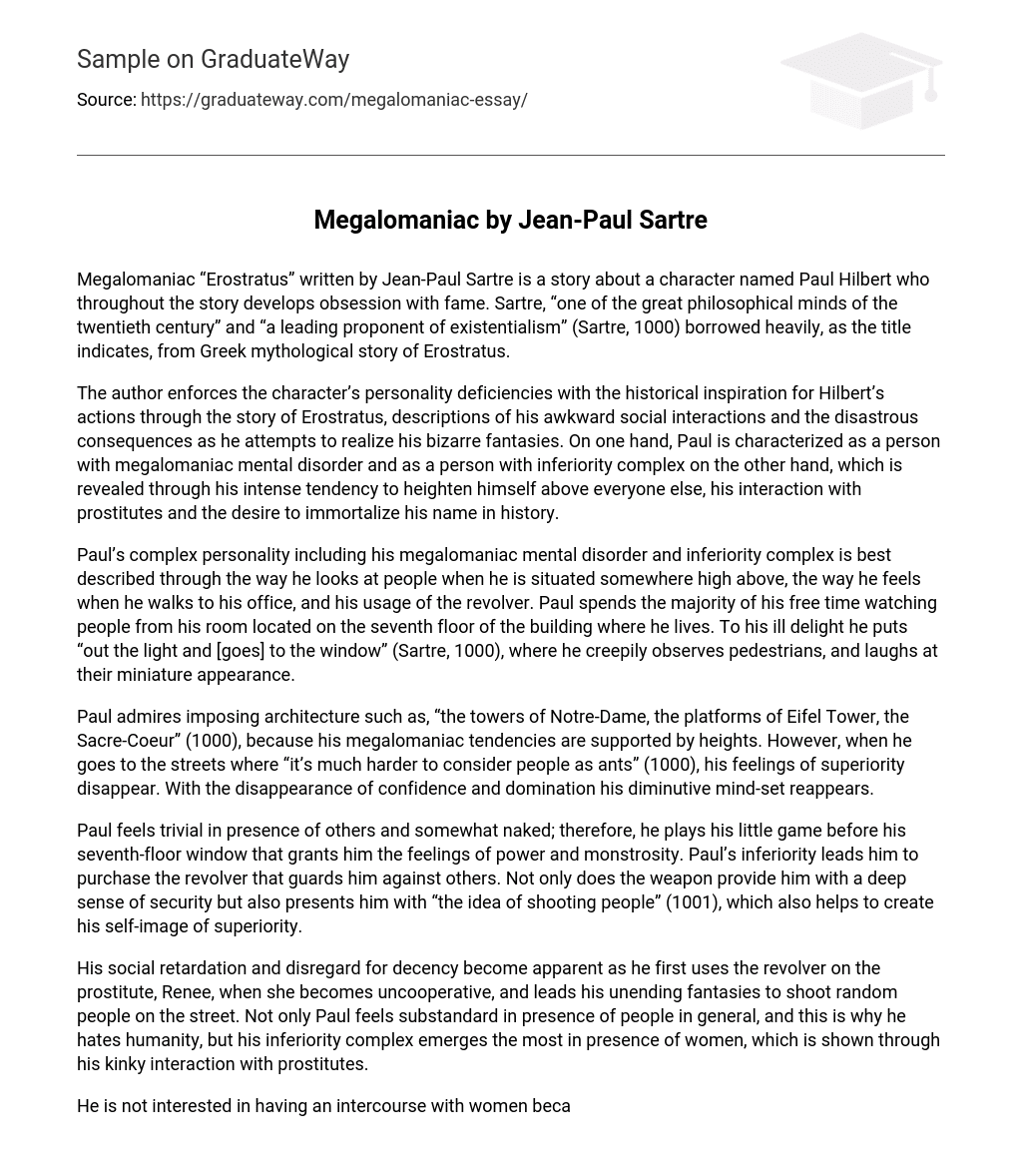The story “Erostratus” by Jean-Paul Sartre revolves around Paul Hilbert’s infatuation with fame. Sartre, renowned as a prominent advocate of existentialism and one of the great philosophical minds of the twentieth century, heavily drew inspiration from the Greek mythological tale of Erostratus.
The author enhances the character’s weaknesses by using historical references, like the tale of Erostratus, to inspire Hilbert’s actions. Moreover, his inept social encounters underscore his shortcomings. As he endeavors to fulfill his peculiar fantasies, the outcomes become catastrophic. Paul is depicted as both suffering from megalomania and harboring an inferiority complex. His consistent longing to surpass others and his involvement with prostitutes accentuate this facet of his temperament. He also yearns for a lasting heritage, aspiring to immortalize himself in history.
Paul’s complex personality, which consists of both a megalomaniac mental disorder and an inferiority complex, is exemplified through his behavior when he looks down on individuals from a high vantage point, his emotions while walking to his office, and his utilization of a revolver. In the building where Paul lives, he spends the majority of his spare time observing others from his seventh-floor room. With a disturbing sense of pleasure, he turns off the lights and situates himself by the window in order to scrutinize pedestrians and ridicule their diminutive stature.
Paul is fascinated by impressive buildings like Notre-Dame’s towers, the Eiffel Tower’s platforms, and the Sacre-Coeur. He appreciates their towering heights, which align with his megalomaniac tendencies. However, when he walks among the streets, he struggles to see people as insignificant ants. In this context, his feelings of superiority fade away, and his small-mindedness returns.
Paul experiences a sense of insignificance and vulnerability when he is around others, so he engages in a private activity by his seventh-floor window that empowers him and makes him feel like a monster. Paul’s feelings of inferiority drive him to buy a revolver as protection against others. This weapon not only gives him a strong sense of safety but also fuels his desire to harm people, thus contributing to his self-perception as superior.
Paul displays a lack of social skills and disregard for moral standards when he resorts to violence against the prostitute named Renee after she declines his demands. This disturbing behavior intensifies as he begins to entertain thoughts of shooting innocent bystanders at random. Paul’s disdain for humanity stems from feeling inferior in social situations, particularly around women, highlighting his deep-rooted insecurities about his self-worth. His interactions with prostitutes further exemplify these unconventional and sexually deviant tendencies.
He chooses not to have sex with women because he believes it would weaken his manhood. Furthermore, he has no interest in giving sexual satisfaction to women, whom he sees as his main opponents, since he thinks they are the ones who gain the most from these encounters. Both parties involved find interactions with prostitutes uncomfortable. He demands that they be nude during their encounters, claiming that it bothers women more than anything else.
He shames prostitutes because it boosts his confidence and makes him feel superior, giving him sexual satisfaction. When he leaves the hotel room with the prostitute Renee, he experiences a sense of malicious accomplishment because he was able to surprise her, which is not an easy feat. This further boosts his ego and transforms his feelings of inferiority into superiority.
Paul becomes obsessed with fame after hearing the story of Erostratus. He believes that the only way to gain recognition is by committing a crime. One of his office colleagues introduces him to Erostratus, a character discussion where Paul is looking for someone who aligns with his interests. Erostratus was a young man driven by a desire for fame and burned down The Temple of Artemis at Ephesus to ensure his name would be remembered throughout history.
Erostratus, openly accepting responsibility for his pyromaniacal act, was executed for his wrongdoing (Wikipedia, par. 1). Paul, influenced by his admiration for Erostratus’ achievement and his disgust towards his society, as demonstrated by his derogatory descriptions of people he meets, eventually devises a well-planned scheme to carry out a mass killing. He sends detailed letters to 102 writers in order to ensure that the incident is accurately documented.
The letter reveals that Paul is driven to madness by his deep-seated hatred for humanity. He is tormented by thoughts of achieving fame through committing murder, and these haunting dreams trap him in a plan from which there seems to be no escape. The very idea of killing followed by notoriety brings him immense satisfaction and boosts his sense of self-worth. Through the first-person perspective, the story offers a profound understanding of Paul’s psyche, a complex blend of opposing disorders that are closely intertwined.
Paul exhibits megalomaniac tendencies that oppose his underlying feelings of inferiority, which serve as the basis for his disdain of humanity and his need to enhance his self-image to feel powerful. His fixation on fame, sparked by his encounter with Erostratus, is particularly evident in the letters he writes to 102 writers. The meticulousness with which he outlines his plan suggests a desire for acknowledgment and eternal legacy. By engaging with prostitutes, we gain insights into his feelings of inadequacy and disturbed sexuality.
His insecurity is demonstrated by his desire to humiliate prostitutes in order to feel superior. Additionally, Paul’s fascination with heights and his immense pleasure in observing people from elevated perspectives foreshadows his megalomaniacal tendencies. The author effectively portrays a character who is entirely consumed by insanity and a deep-seated loathing for humanity.





